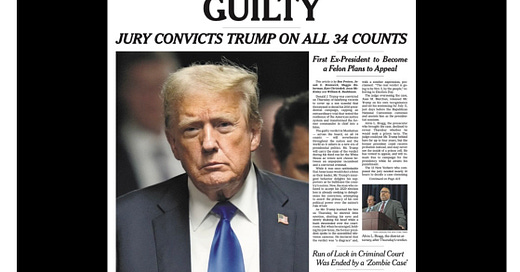Damn the Trump Verdict
Why Russia's Putin and other autocrats benefit from Trump guilty verdict
Just as I was putting the finishing touches on a piece about the elections in South Africa, India, and Mexico, the Trump verdicts came in. (Yeah, my Thursdays suck.) Guilty on all 34 felony counts. Donald Trump has become the first ex-president to be convicted of crimes — a felon.
It is a decision, the NYT editorial board says, “offer(s) yet another reminder — perhaps the starkest to date — of the many reasons Donald Trump is unfit for office.”
There has never been a doubt that Trump is unfit for the presidency. For him, the presidency is a platform for personal plunder. Governance is an afterthought, if it is a thought at all. That is what makes him so appealing to authoritarians worldwide, particularly Benjamin Netanyahu and Vladimir Putin. Trump not only models despicable, despotic behavior, he paves the way for it to become the norm.
Yesterday’s conviction has given autocrats something much more valuable however — an American political figure bent on questioning America’s rule of law and disrupting the country’s democratic foundations. That has long been Putin’s goal.
Vladimir Putin ascended to power in 1999, nearly a decade after the collapse of the Soviet Union. As he did, he wrote in Nezavisimaya Gazeta that Russia faced “the real danger that it could be relegated to the second or even the third tier of global powers.” In 2005, in his annual presidential address, he noted that that collapse “was the greatest geopolitical catastrophe of the century.” He has shaped his two decades in power around avenging that perceived wrong — a wrong he believes have come at the hands of Washington and Brussels.
In 2016, Putin exploited the wide open and vulnerable social media space, spearheading an online disinformation campaign against Hillary Clinton and her presidential bid against Donald Trump. It would only be in Trump’s final year in office, in 2020, that the US Senate confirmed the election interference. By then, Trump’s “America First” approach had alienated allies in Europe, chilled relations with the world’s second largest economy, China, and put into question America’s international commitments. In the US, the world had witnessed Trump’s support for white supremacists and continued propensity to exaggerate and lie — both of which contributed to further polarization.
In February 2022, Putin invaded Ukraine. It came a year into Joe Biden’s presidency and the renewed focus on American leadership and global democracy — and a few months after the disastrous American pull out of Afghanistan that August. It was a calculation that despite talking up America’s role in the world, Biden, much like his former boss, would have no appetite to respond to a seizure of more Ukrainian territory. On that he was wrong. Biden not only mounted a robust and coordinated defense of Ukraine, he inspired both Finland and Sweden to join NATO.
Fast forward to early 2024. The US Congress was divided on sending aid to Ukraine. The presumptive Republican nominee for president, Donald Trump, opposed it. Moreover, he reiterated his discontent with NATO. On February 9, on a campaign stop in South Carolina, Trump noted that Russia "could do whatever the hell it wants" if NATO members don't meet their financial obligations. That should have prompted Putin to rub his hands in evil laughter. And perhaps it did. It did not prompt him to come out in favor of Trump however.
A week later, a day before Alexei Navalny’s death on February 15, a Russian television journalist asked Vladimir Putin about who would be “better” for Russia in the US election this November. “Biden is a more experienced, predictable person,” he said.
What the Russian president left out was that Donald Trump is more useful to him out of power and in the opposition. Having witnessed the January 6 insurrection and Trump’s behavior thereafter, including during the recent hush-money trial in New York, Putin prefers Trump carrying on false claims that the American electoral and judicial system are rigged and peddling conspiracy theories about the “deep state.” It not only riles up the MAGA masses, it weakens America’s image as a country dedicated to “democracy.” Worse, it sows doubt about American institutions and its rule of law. That’s not only bad for Americans, it’s bad for what’s left of the so-called “rules-based world order.” (This is a post on its own.)
Trump’s conviction, The Economist writes, “should both shock the nation and reassure it about its capacity to achieve justice.” It goes on to say that it will “probably accomplish neither.” Trump and his supporters will claim bias and disparage the American judicial system. It will stoke more chaos and polarization. In the case that he loses in November, which is a big if, expect that to only get worse.
We’re damned if Trump wins. We’re damned if he loses. And that’s damn good for the likes of Vladimir Putin and autocrats of the world. — Elmira
I’ll post about the South African, Indian, and Mexican elections over the next few days. And we’ll be back with the regular links next Friday. Happy weekend. And happy Pride. 🏳️🌈
Editorial Team
Elmira Bayrasli - Editor-in-Chief
Editors:
Pin-Shan Lai
Catherine Lovizio
Emily Smith





